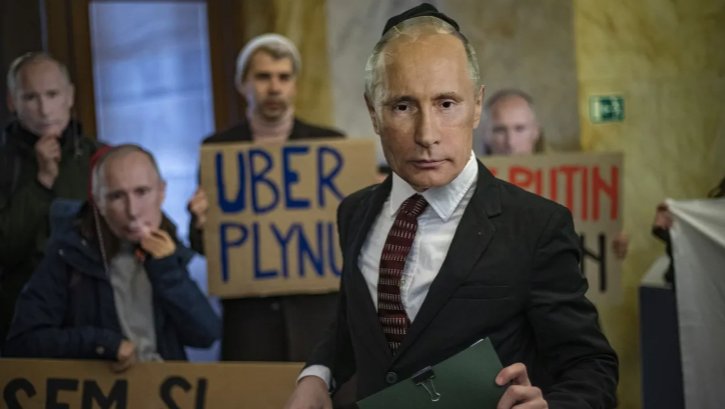On 15 November 2022, the Chamber of Deputies of the Czech parliament adopted a resolution which declared the current Russian regime terrorist. The MPs condemned large-scale attacks on the Ukrainian civilian population and key energy infrastructure. They also stressed out they did not recognise the results of the referendums on annexation of the four Ukrainian regions.
A total of 129 out of the 156 MPs voted in favour of the resolution, and only 14 voted against it, all of the populist far-right Freedom and Direct Democracy (SPD) party. The remaining 13 MPs from various political forces abstained.
The recognition of Russia as a terrorist state has marked the end of the years-long policy of Prague’s rapprochement with Moscow promoted by Miloš Zeman, formerly the PM and currently the president of the country.
Zeman called it quits with Russia on his own, cynically and easily switching sides by joining his former political opponents this year. “This is an act of unprovoked aggression which should be consistently condemned not only with words, but also with actions,” Zeman said. “Russia has lost almost everything and gained nothing by invading Ukraine.”
Zeman is not the only “pro-Russian” Czech politician, but it was him who became the symbol of “friendship with Russia”. Although the role of president is somewhat ceremonial (the Czech Republic is a parliamentary country, directly administered by the Prime Minister and his cabinet), Zeman has managed to broaden his political influence over the decades of his career. His Russophilia was, to a large extent, founded upon the long history of Moscow-Prague relationships.
The Moscow pendulum
The Czech romantic Russophilia traces back to the late 18th century when the leaders of the Czech National Revival sought support in a strong and independent “Slavic brother” longing for their own national identity.
Karel Havlíček Borovský, a prominent poet and journalist, came to Moscow in the 1840s with a bagful of Slavophilic beliefs, but had his ideals dissipated rather quickly, hammered by the reality of an absolutist imperial regime. Borovský was left disillusioned after meeting the Russian Panslavists: “Russians refer to everything Russian as Slavic only to refer to everything Slavic as Russian afterwards,” he wrote in his Pictures from Russia.
Following the 1989 Velvet Revolution, the main issue in the Moscow-Prague relationship was the Soviet military presence from Czechoslovakia. Starting from 1991, when the troops had withdrawn, the relationship began to improve significantly.
A real breakthrough happened in the late 1990s owing to two things: the beginning of Czechia’s process of joining NATO which provided a feeling of military security, and the intention of Zeman, then PM, to improve the mutual relationship.
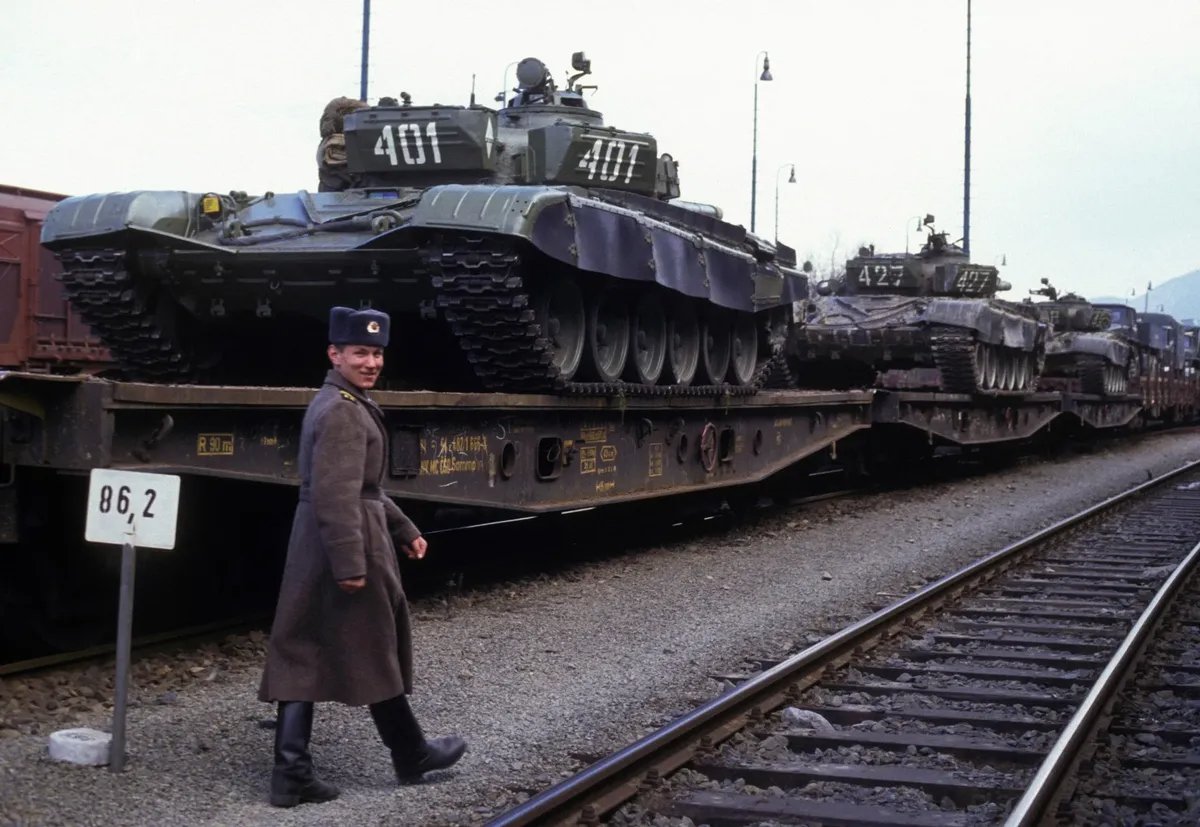
The withdrawal of Soviet troops from Czechoslovakia, 26 February 1990. Photo: Gilles BASSIGNAC / Gamma-Rapho / Getty Images
Zeman’s policy found support among those social groups that were disappointed by the privatisation of socialist enterprises that took place after the Velvet Revolution, as well as in other reforms. Having been hurt economically, a proportion of Czechs lost their faith in democratic institutions.
They were attracted by the potential close ties with Russia. The general motto was: “Russia is a huge market to revive our industry!”
After Václav Havel left his presidential position in 2003, the Czech politicians started suggesting an alternative to the Atlantic orientation more and more often. Those enterprisers who made fortunes trading with Russia were worried that the Czech government might promote a foreign policy based on the revolutionary ideals. The businesspeople became really concerned that some sort of “political” trade restrictions could be introduced.
The younger generations of Czechs benefited from the revolutionary technological changes of the 1990s, especially in terms of communications. The youth joined the new economic structure. At the same time, the habitual routine vanished for a proportion of the older generation, especially people residing in the provinces, pushing them towards nationalist populism. They wished to return the greater sovereignty of “ethnic states” and missed the “traditional values”.
The victory of billionaire Andrej Babiš’s populist movement “Yes” (ANO) at the 2017 parliamentary election, and, most importantly, Miloš Zeman’s repeated victory at the 2018 presidential election was largely the result of resentment among these social groups.
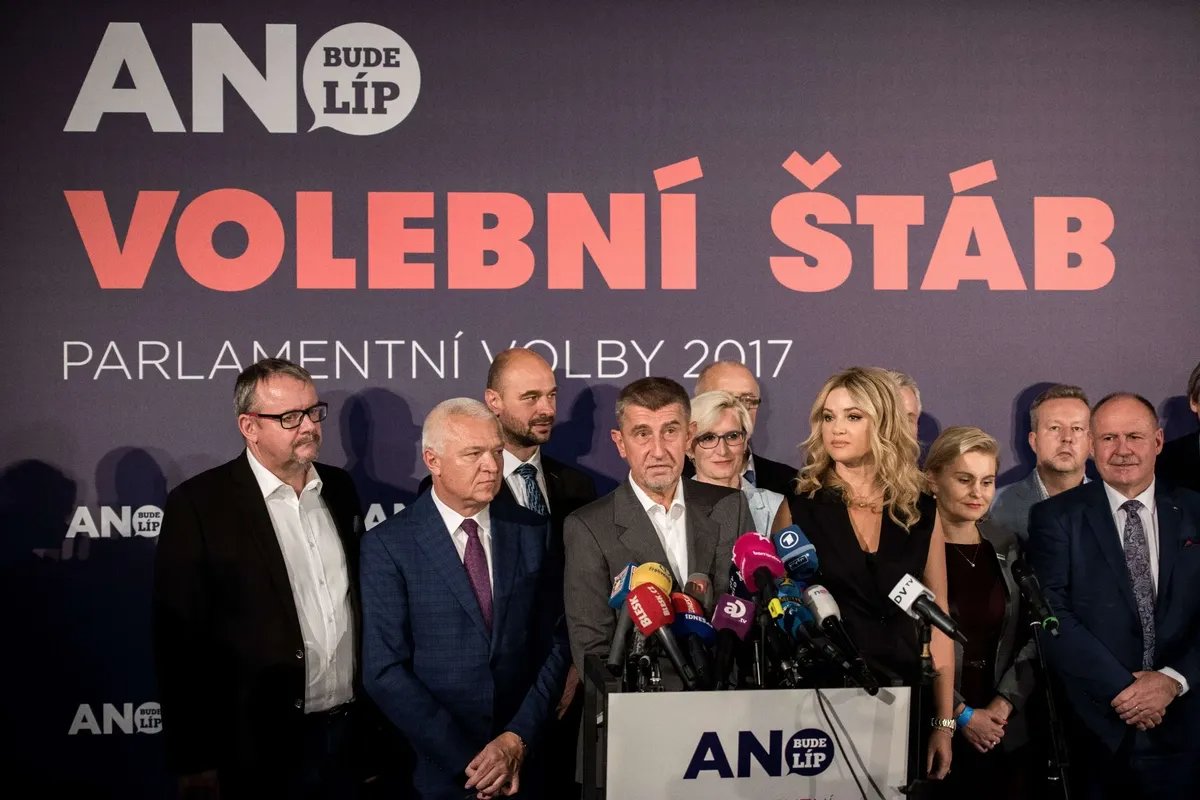
ANO leader Andrej Babiš (in the middle) holds a press conference at the ANO headquarters following the Czech parliamentary election, 21 October 2017. Photo: Lukas Kabon / Anadolu Agency / Getty Images
The war of monuments
The rise of populist and fairly pro-Russian forces to power triggered a backlash from the young Czech politicians with pro-European views. They tried to resist Zeman’s rapprochement with Russia in a very unusual way by starting the so-called “war of monuments”.
In 2020, on the 75th anniversary of the Prague Uprising and the liberation of Czechoslovakia, a monument to the fighters of the Russian Liberation Army was erected in the western part of Prague. This monument is often referred to as the monument to the Vlasovites [a collaborationist formation that fought under German command during WW2] in the Russian-language media.
A few weeks prior to this, a monument to Ivan Konev, a Soviet marshal, was dismantled in Prague. The monument was unveiled in 1980 on the 35th anniversary of Czechoslovakian liberation from Hitler’s army. The dispute about the role of Konev in the history of Eastern Europe arose around 2015 when it took the form of a wide public discussion, including on social media.
The monument’s pedestal was covered with inscriptions or red paint numerous times. In 2018, the district authorities mounted plaques with information on Konev’s negative role in the occupation of Czechoslovakia by the troops of the Warsaw Pact countries, as well as details of his participation in the bloody suppression of the 1956 Hungarian uprising.
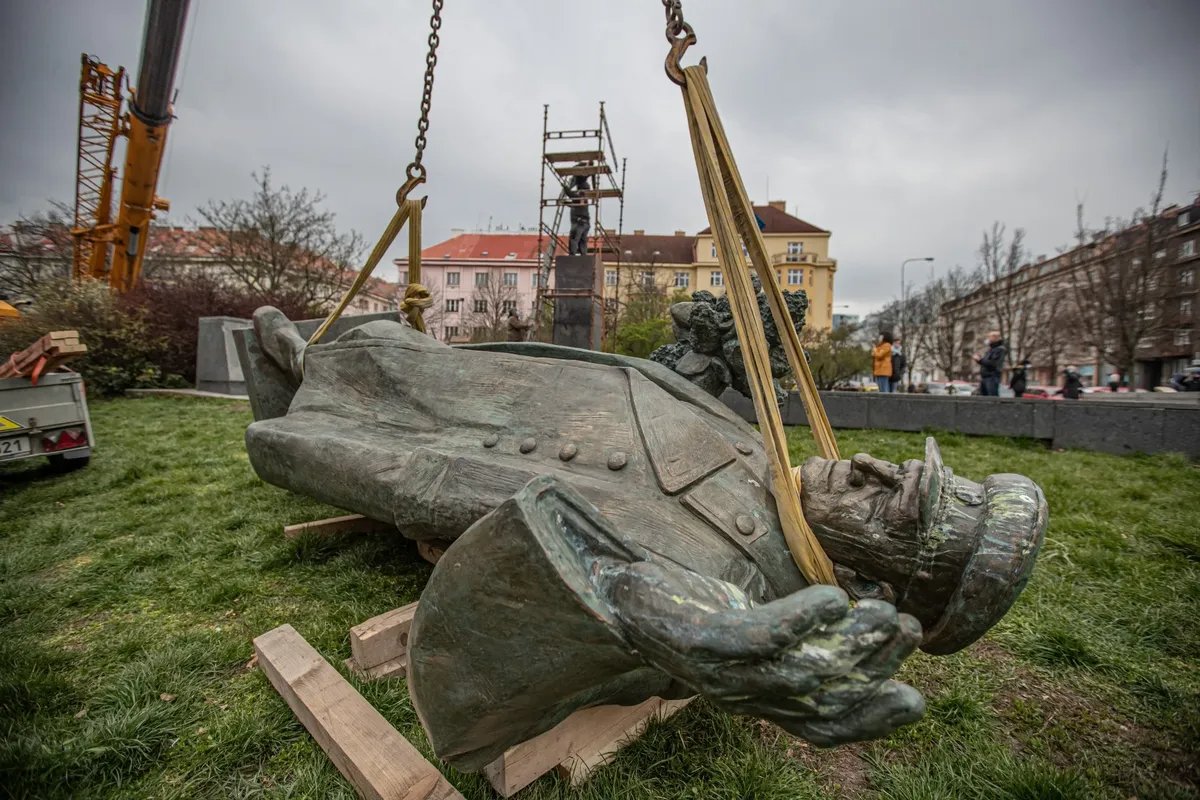
The dismantled monument to Ivan Konev, Prague, April 2020. Photo: EPA-EFE / MARTIN DIVISEK
The square where the Russian embassy in Czechia is located was renamed the same year by the city council. From then on, the facade of Russia’s main diplomatic mission in the country has been overlooking a square named after the assassinated Russian opposition politician Boris Nemtsov.
All these demonstrative actions triggered a predictable and negative reaction in Russia, as well as the consolidation of anti-Putin forces in Czechia.
The explosion after Vrbětice
The Czech-Russian relations suffered aggravation for the first time in 2014 following Russia’s military aggression against Ukraine. The Czech Republic actively supported the international sanctions. However, Miloš Zeman suggested that the sanctions be waived as soon as in 2016.
It was the Vrbětice incident that became game-changing, although not immediately, for the mutual relationship of the two countries. Two explosions rattled an ammunition depot in Vrbětice, the Zlín Region, in October and December 2014.
The depot was leased by a private Czech company which supplied weapons to Ukraine. The explosions took the lives of two people, and the neighbouring localities were evacuated.
It took years to complete the investigation; the explosions did not cause political aggravation at first as the true cause of what had happened was unknown. It was only in April 2021 when the Czech government published the conclusions written in a secret report by the Security Service which said that members of Russian secretive agencies were involved in the incident, causing a sabotage.
The outburst of public outrage hit those backing good relations with the Putin regime. On 29 April 2021, protesters started demanding the resignation of the treacherous Zeman. Czechia’s government evicted Russian diplomats from the country, and Slovakia, Lithuania, Latvia, and Estonia did the same shortly afterwards.
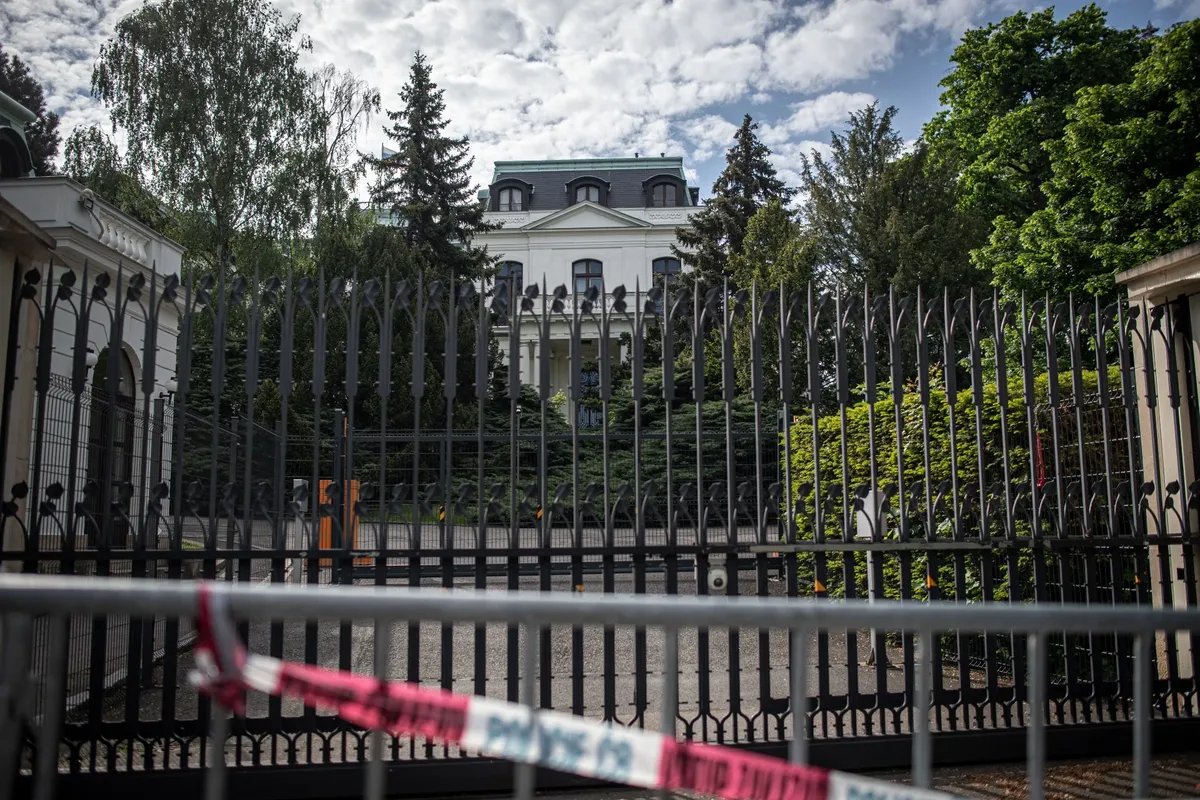
Russia’s embassy in Czechia. Photo: Lukas Kabon / Anadolu Agency / Getty Images
Babiš’s government ceased to exist after the 2021 parliamentary election, and the country’s centrist and right-centrist parties reached an agreement to form a majority coalition government.
Jan Lipavský of the Pirate Party became the new Czech Foreign Minister. When the Konev monument was being dismantled, Lipavský stated: “This monument is nothing but the expression of servility before the Moscow leadership.”
It became clear after the Ukraine War started that the restoration of relations between Czechia and Russia was out of the question in the upcoming years. Even a potential comeback of Andrej Babiš as PM would change nothing.
Zeman’s second presidential term is nearing its end, and his political influence is growing weaker: he has failed to stave off Lipavský ‘s appointment, although he tried to do it. The anti-government rallies organised by the radical “Czech Republic First!” movement are still marginal and supported mainly by those political forces who were routed in the last year’s election, namely communists, socialists, and nationalists.
The post-war restrictions
The recognition of Russia as a terrorist state became one of the links in the chain of decisions that gradually introduced restrictions against Russia and Russian nationals in Czechia after the start of the Ukraine War.
It was as early as the second day of Russia’s invasion when Czechia suspended the issue of visas for Russians, becoming the first EU member to do so. The ban is still on, excluding humanitarian cases. The Czech authorities began barring Russians with active Schengen visas issued for tourism, sports or culture purposes from entering the country on 25 October.
The sanctions that were imposed against Russia hit Russian students in Czechia like a boomerang. It turned out that studying at some faculties can be considered “providing technical assistance to the Russian Federation.”
This notion indeed implies that the EU member states are not allowed to teach certain strategic domains to Russian and Belarusian students due to sanctions. The domains in question include nanotechnology, aviation and nuclear technology, as well as IT.
Luckily, the readiness of many universities to co-operate, and sometimes pressure from certain community-based organisations allowed for a solution of the issue on the whole. The colleges offered the students in “critical” domains to transfer to a different specialty or to set up an individual study track. The post-graduates were allowed to change the topic of their dissertation so that their research would no longer be considered “critical”.
Another strong blow to the Russian diaspora was the sanctions imposed against Russian banks. The people found themselves cut off from retirement money and rental or other income from Russia.
Russian parents faced a challenge sending money to their children studying at Czech colleges. This resulted in communities emerging on social media, offering currency exchange for those willing to send or receive money.
Among these restrictions, the resolution of the Czech parliament which declared that Russia was a terrorist state is more of a political statement that may become the basis for further practical steps, for example, sanctions expansion. However, this declaration does not bear any direct consequences so far either for businesses that somehow continue to work with Russia or for Russian nationals living in Czechia. Czech law, unlike US law, does not have legislation regarding, or a notion of, “terrorist state” or “state sponsor of terrorism”.
Political representation
There is no single integral Russian diaspora in today’s Czechia. The people there interact within small groups, and most Russians tend to stay away from politics as they are used to, so they have little to none political representation in the country.
Community-based organisations created by Russians have little influence on Czech politics due to their small number and small political capital. In addition, many communities and Russian-language media had been under the control of the Russian embassy until recently.
The pro-opposition Russians have some political support in the Czech society: an informal association called Friends of a Free Russia has been operating in the country since February 2021. The group believes in the idea of a free and democratic Russia and supports Russia’s civil society. The association works in both houses of the Czech parliament and cooperates with the country’s civil society and academia. One of the group’s members is Marek Hilšer, a senator and a candidate for president.
The shocking news about the beginning of the Ukraine War rocked the Russian diaspora in Czechia. No less than three thousand people attended the Russians Against the Ukraine War rally on 26 March 2022. The re-established Russian Prague Anti-war Committee organised several major rallies in support of Ukraine. However, it is unclear at this point whether the Russian activists would keep up momentum and good numbers for long.
There is an understanding in Czechia’s political environment that Russia would not simply vanish together with Putin, so the increasing activity of the democratically-minded Russians meets support. This gives some hope that things will not get worse for the Russian diaspora.
Join us in rebuilding Novaya Gazeta Europe
The Russian government has banned independent media. We were forced to leave our country in order to keep doing our job, telling our readers about what is going on Russia, Ukraine and Europe.
We will continue fighting against warfare and dictatorship. We believe that freedom of speech is the most efficient antidote against tyranny. Support us financially to help us fight for peace and freedom.
By clicking the Support button, you agree to the processing of your personal data.
To cancel a regular donation, please write to [email protected]
